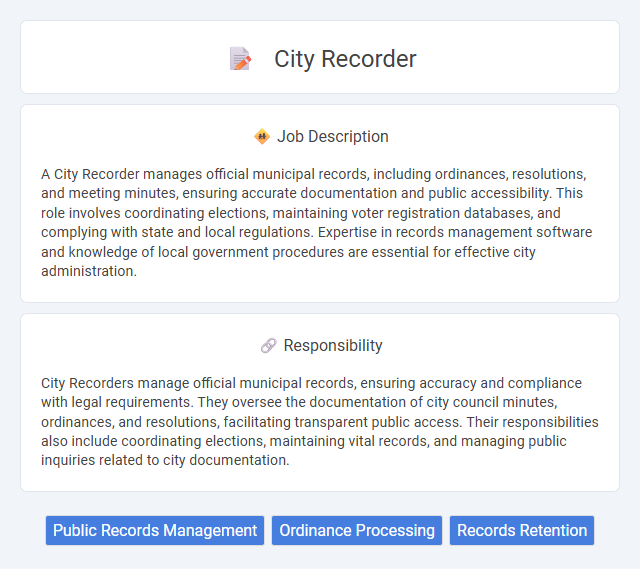
A City Recorder manages official municipal records, including ordinances, resolutions, and meeting minutes, ensuring accurate documentation and public accessibility. This role involves coordinating elections, maintaining voter registration databases, and complying with state and local regulations. Expertise in records management software and knowledge of local government procedures are essential for effective city administration.
City Recorder positions may be suitable for individuals who are detail-oriented, organized, and comfortable managing official records and documentation. People who prefer routine tasks and possess strong communication skills could find this role engaging and fulfilling. Those who struggle with administrative accuracy or working within bureaucratic environments might find the job less compatible with their preferences.
Qualification
A City Recorder must possess a thorough understanding of municipal laws, record-keeping standards, and public administration, often requiring a bachelor's degree in public administration, political science, or a related field. Proficiency in digital document management systems, strong organizational skills, and attention to detail are critical for maintaining accurate city records, ordinances, and official documents. Experience with government transparency regulations and excellent communication abilities enhance the Recorder's effectiveness in managing public information and coordinating with city officials.
Responsibility
City Recorders manage official municipal records, ensuring accuracy and compliance with legal requirements. They oversee the documentation of city council minutes, ordinances, and resolutions, facilitating transparent public access. Their responsibilities also include coordinating elections, maintaining vital records, and managing public inquiries related to city documentation.
Benefit
City Recorders likely benefit from comprehensive retirement plans and health insurance packages, offering financial stability and peace of mind. They may also experience job security and opportunities for career advancement within municipal government. Access to training and professional development resources probably enhances their skills and job satisfaction.
Challenge
A City Recorder job likely involves managing complex municipal records, which may present challenges in maintaining accuracy and accessibility under strict regulatory requirements. The role probably demands strong organizational skills to handle diverse documentation and coordinate with multiple departments effectively. Navigating evolving legal standards and technological updates could further contribute to the complexity of this position.
Career Advancement
City Recorder roles offer clear pathways for career advancement within municipal government, often leading to positions such as City Clerk or Deputy City Manager. Gaining expertise in records management, public administration, and legal compliance enhances prospects for promotion and increased responsibilities. Professional certifications like Certified Municipal Clerk (CMC) can significantly boost career growth opportunities.
Key Terms
Public Records Management
City Recorders specialize in public records management, ensuring accurate maintenance, organization, and accessibility of municipal documents. They implement retention schedules compliant with state regulations and facilitate public transparency through efficient records retrieval systems. Expertise in digital archiving and data protection enhances information security and community trust.
Ordinance Processing
City Recorders play a crucial role in ordinance processing by accurately documenting and maintaining municipal laws and amendments. They ensure all ordinances are properly recorded, published, and accessible for public reference, supporting legal compliance and transparent governance. Efficient ordinance processing by City Recorders facilitates timely updates to city codes and fosters informed decision-making by local officials.
Records Retention
City Recorders ensure compliance with records retention schedules by systematically organizing, maintaining, and safeguarding municipal documents. They implement state and local regulations governing the preservation and disposal of official records to protect public information and support transparency. Effective records retention reduces legal risks and facilitates easy access to historical data for city administration and citizens.
 kuljobs.com
kuljobs.com